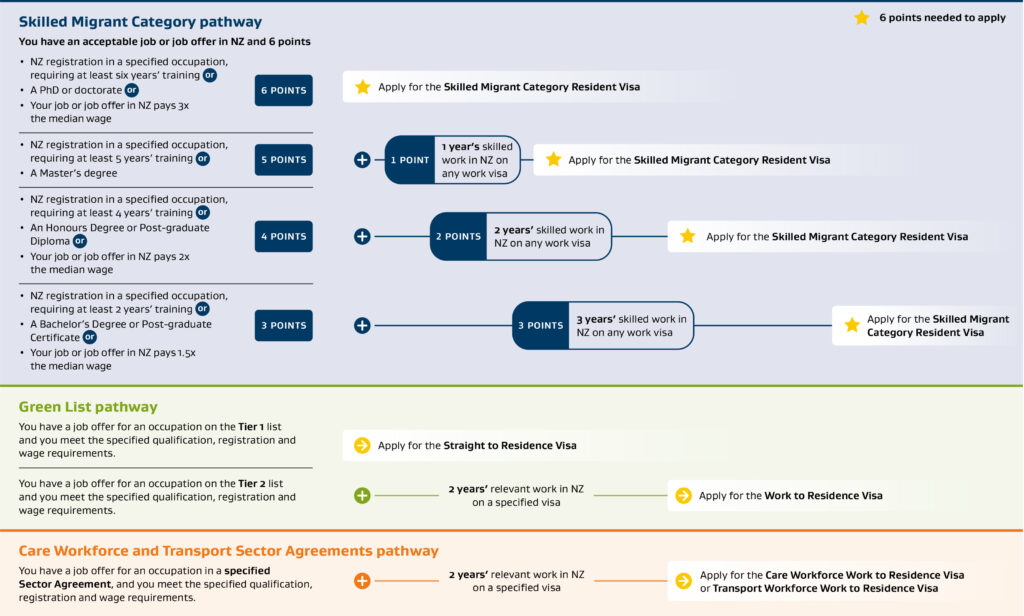New Zealand Residency: The New 6-Points Changes and Other Pathways
- By Vineet Bhardwaj
- Immigration Changes, Immigration New Zealand, New Zealand, Resident visa
- 160 comments

Introduction
On 21st June 2023, Immigration New Zealand (INZ) announced significant changes to the Skilled Migrant Category Resident Visa. These changes, set to be implemented from 9th October 2023, aim to streamline the immigration process and ensure that skilled migrants meet specific criteria.
In this blog, we will provide a comprehensive overview of the changes, including the new points system, categories of resident visas for skilled migrants and the introduction of the Skilled Migrant Category Interim Visa.
Overview of Changes
The upcoming changes to the Skilled Migrant Category Resident Visa include the following:
New Points System (Summary): Under the new points system, applicants will need a minimum of 6 points to be eligible for the Skilled Migrant Category Resident Visa. Points can be claimed from the following skill indicators:
- New Zealand occupational registration
- Qualification (Bachelor’s degree or higher)
- Income from job or job offer (earning at least 1.5 times the median wage in New Zealand).
You can only claim points from only 1 of the above skill indicators. You cannot combine points from multiple skill indicators. For example, you cannot combine points from your qualification with points from your New Zealand occupational registration.
In addition,
- Points can also be claimed for each year of skilled work experience in New Zealand, up to a maximum of 3 points. You can also claim 1 point for each year of skilled work in New Zealand, up to a maximum of 3 points.
- The points you claim from skilled work in New Zealand can be combined with points from your New Zealand occupational registration, qualification or income.
For a better understanding, please refer to the chart below.

Explanation of the Chart
The First Step: You must have a Skilled Job or Job Offer
To be eligible for the Skilled Migrant Category Resident Visa, you must have a skilled job or job offer from an accredited employer in New Zealand. This requirement applies regardless of how many points you are claiming. This requirement applies even if you are claiming the maximum amount of points available. To be considered a skilled job, the job or job offer must be:
- at least 30 hours a week.
- either in an ANZSCO Level 1 to 3 occupation and paid at or above the median wage, or in an ANZSCO Level 4 to 5 occupation and paid at or above 1.5 times the median wage.
- on a permanent contract or fixed-term contract for at least 12 months.
After you have secured a skilled job offer or skilled employment, the next steps are to assess the following:
1. New Zealand occupational registration points
If your occupation is listed on the eligible New Zealand occupational registrations by INZ, you can utilize your registration to earn points. The points awarded will be higher for registrations that demand extensive training.
Points available for occupational registration
| Points | Requirements |
| 6 | A minimum of 6 years of training is required to gain registration. |
| 5 | A minimum of 5 years of training is required to gain registration. |
| 4 | A minimum of 4 years of training is required to gain registration. |
| 3 | A minimum of 2 years of training is required to gain registration. |
List of eligible occupational registrations
You can find out what New Zealand occupational registrations are eligible, and the points awarded for each registration on our website.
Claiming skilled resident points from occupational registration
If you are claiming points for skilled work in New Zealand
To claim further points for skilled work experience in New Zealand, you must have obtained your occupational registration before gaining the experience.
2. Qualification points
Depending on the level of qualification you possess and its New Zealand Qualification Framework (NZQF) level, you can potentially receive anywhere from 3 to 6 points when making a claim.
Points available for qualifications
| Points | Qualification (Equivalent under the NZQF) |
| 6 | Level 10 Doctoral Degree |
| 5 | Level 9 Master’s Degree |
| 4 | Level 8 Bachelor Honours Degree or Postgraduate Diploma |
| 3 | Level 8 Postgraduate Certificate Level 7 Bachelor’s degree |
Overseas qualifications
If you possess a qualification obtained from a country other than New Zealand, it might be necessary to undergo an evaluation process conducted by the New Zealand Qualifications Authority (NZQA). The purpose of this assessment by NZQA is to determine the following aspects of your qualification:
- Its equivalence in terms of qualification type, and
- Its corresponding NZQF level.
Non-degree qualifications
If you possess a qualification that is a non-degree qualification at NZQF Level 7 or below, you won’t be eligible to receive points under the updated points system.
3. Income points
You can utilize your earnings from your employment to accumulate points. This proficiency gauge will serve as a substitute for the previously announced Highly Paid Residence Visa in 2022, granting highly paid immigrants the opportunity to seek the new Skilled Migrant Category Resident Visa instead.
NOTE
Applications for the Highly Paid Residence Visa were planned to open on 29 September 2023. If you intended to apply for the Highly Paid Residence Visa, you can now apply for the Skilled Migrant Category Residence Visa instead from 9 October 2023.
Points available for income
| Points | Wage threshold |
| 6 | Job or job offer in New Zealand at 3 times the median wage (NZD $88.98 an hour as on 26 Jun 2023) or more. |
| 4 | Job or job offer in New Zealand at 2 times the median wage (NZD $59.32 an hour as on 26 Jun 2023) or more. |
| 3 | Job or job offer in New Zealand at 1.5 times the median wage (NZD $44.49 an hour as on 26 Jun 2023) or more. |
The job or job offer must be:
- from an accredited employer
- at least 30 hours a week, and
- on a permanent contract or fixed-term contract for at least 12 months.
If you are claiming points for working in New Zealand
If your intention is to utilize your expertise gained in New Zealand for earning additional points, it is crucial to ensure that you consistently meet the required wage level during your tenure of skilled work. To illustrate, if you intend to claim 4 points by earning twice the median wage, it is imperative that you maintain this wage level throughout your two-year period of skilled work experience in New Zealand. Furthermore, you will be required to provide evidence of meeting the wage threshold both at the commencement and conclusion of your skilled work experience period.
4. Skilled work experience in New Zealand points
You can receive 1 point for every year of skilled work experience you possess in New Zealand, with a maximum limit of 3 points.
Check the skilled work requirements
The skilled work experience must be in a full-time job (minimum of 30 hours a week). There is also a wage threshold depending on the ANZSCO level of the job:
- People in ANZSCO level 1 to 3 roles must earn the median wage or above.
- People in ANZSCO level 4 to 5 roles must earn 1.5 times the median wage or above.
You can claim points for skilled work experience in New Zealand from:
- 36 months during the 60 months before you apply if you are claiming 3 points.
- 24 months during the 48 months before you apply if you are claiming 2 points.
- 12 months during the 24 months before you apply if you are claiming 1 point.
Some requirements are not changing
Please note that the following requirements for the Skilled Migrant Category Resident Visa are staying the same. These include:
- character requirements
- health requirements
- English language requirements
- age requirements (you must be 55 years old or under to apply).
You can include your partner and any dependent children up to the age of 24 in your application. They also must meet INZ English language requirements.
Skilled Migrant Category Interim Visa
If you apply for the new Skilled Migrant Category Resident Visa and your current temporary visa expires while your application is being processed, Immigration New Zealand (INZ) will grant you a Skilled Migrant Category Interim Visa. This visa will allow you to stay in New Zealand while your Skilled Migrant Category Resident Visa is processed.
The Skilled Migrant Category Interim Visa will come into effect the day after your current visa expires. INZ will send you an eVisa with the appropriate duration and conditions. You will also be able to travel in and out of New Zealand on your Skilled Migrant Category Interim Visa.
Any conditions that apply to your current visa will apply to your Skilled Migrant Category Interim Visa. However, you will not be able to apply for another temporary visa once you are on a Skilled Migrant Category Interim Visa.
The Skilled Migrant Category Interim Visa will expire based on the earliest of the following options:
- 24 months after the start date,
- the date your residence visa is approved, or
- if the residence visa application is declined or withdrawn, 2 months after the decision is made on your residence application.
What do the changes mean?
If we take a holistic view of the changes, they essentially mean that when the new Skilled Migrant Category takes effect in October 2023, people will need to meet specified requirements for their residence pathway, along with standard requirements in areas like age, English language, health, and character.
Moreover, the changes may also adversely affect the chances of students who are currently enrolled in up to level 7 (Graduate Diploma courses) studies. They have to either upskill or be able to land a high-paying job. Simply because there are no points allocated for qualifications below a bachelor’s degree. For such cohort, the residency pathways could be via Care workforce Work to Resident Visa, Transport Work to Residence Visa, the Green List Straight to Residence pathway (if their qualification is listed in the Green List requirements), or a job offer in New Zealand that pays at least 1.5 times the median wage.
Other pathways to New Zealand residency

Straight to Residence Visa
The resident visa category called the Straight to Residence Visa is already effective for highly skilled people. This visa allows highly skilled workers who meet specific criteria to apply for New Zealand residence directly and get results relatively faster. The Straight to Residence Visa aims to attract and retain individuals with exceptional skills and expertise that are in high demand in New Zealand.
You are eligible to apply for this visa if you are employed by an accredited employer or have received a job offer from such an employer, and your position falls under Tier 1 of the Green List.
If you meet the requirements, you have the option to apply for this visa at present. You can choose to either come to New Zealand on a work visa and submit your application or apply from outside the country.
Work to Residence Visa
The Work to Residence Visa is designed for individuals who have a job offer in New Zealand but do not qualify for the Straight to Residence Visa. This visa allows the applicant to work in New Zealand for a period of 24 months, with the opportunity to transition to residence after working for a period of 24 months in a skilled occupation.
If you are currently employed by an accredited employer and have been working in a position listed on the Tier 2 Green List for a period of 24 months, you are eligible to submit an application for this visa. The visa application process will commence on 29th September 2023.
Care Workforce Work to Residence Visa
The Care Workforce Work to Residence Visa is a specific visa category aimed at addressing the growing demand for workers in the aged care, disability care, and home support sectors.
You can apply for this visa if you work for an accredited employer and you have worked in a care workforce sector role for 24 months.
Applications for this visa will be open from 29 September 2023 as this is when the first group of people will become eligible to apply.
Transport Work to Residence Visa
The Transport Work to Residence Visa is designed for individuals who have a job offer in the transport sector in New Zealand.
You can apply for this visa if you work for an accredited employer and you have worked in a transport sector role for 24 months. Applications for this visa will be open from 29 September 2023 as this is when the first group of people will become eligible to apply.
Conclusion
The changes to the Skilled Migrant Category Resident Visa introduced by INZ represent a significant shift towards a more streamlined, simplified and focused immigration process. By implementing a new points system and introducing specific requirements, the changes aim to ensure that individuals coming to New Zealand possess the necessary skills and qualifications to contribute effectively to the country’s workforce.
From our perspective, the changes provide a clearer framework for applicants, making it easier to understand the requirements and determine eligibility. The focus on occupational registration, qualifications, income, and skilled work experience aims to prioritize individuals with relevant skills and experience, ultimately benefiting New Zealand’s economy.
In our opinion, these changes represent a positive step towards enhancing New Zealand’s skilled migration program. The new points system provides a transparent, simplified and objective framework for assessing applicants’ qualifications, work experience, and income, ensuring that the most highly skilled individuals are selected for residency. The introduction of specialized work-to-residence pathways acknowledges the unique demands of certain sectors and aims to address labour shortages in the affected sectors.
Furthermore, the implementation of the Skilled Migrant Category Interim Visa ensures that applicants can maintain their immigration status and continue working while their resident visa applications are being processed, providing a smoother transition for individuals seeking to make New Zealand their home.
Overall, these changes reflect New Zealand’s commitment to attracting and retaining skilled talent, promoting economic growth, and supporting sectors facing workforce challenges. By aligning immigration policies with the country’s evolving needs, New Zealand is striving to benefit from the contributions of skilled migrants in various industries and continue to thrive as a diverse and prosperous nation.

Contact Us
For all your New Zealand visa-related queries, you can contact Vineet, your friendly Licensed Immigration Adviser through:
Email: vineet@visaadvice.info
WhatsApp: +64 223006101
Fill up a small form: https://visaadvicenewzealand.co.nz/contact/
Follow us at
Website: https://visaadvicenewzealand.co.nz/
Facebook: https://www.facebook.com/VineetNZ/
LinkedIn: https://www.linkedin.com/in/vineet-bhardwaj-533647144/
Instagram: https://www.instagram.com/visaadvicenz/
YouTube: https://youtube.com/c/VINEETBHARDWAJNZ
Read our blogs: https://visaadvicenewzealand.co.nz/blogs/
Reach us

